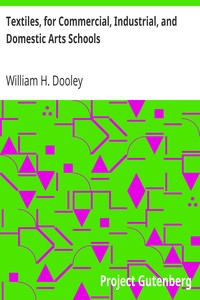Textiles, for Commercial, Industrial, and Domestic Arts Schools by Dooley
"Textiles, for Commercial, Industrial, and Domestic Arts Schools" by William H. Dooley is an educational publication written in the early 20th century. The text serves as a comprehensive resource for vocational schools, focusing on the manufacturing and testing of textiles across various applications like commercial, industrial, and domestic arts. The guide aims to fill a void in specialized education by providing detailed insights into fibers, yarns, and the processes involved in textile
creation. The opening of the book introduces the concept of textiles, defining them as materials made from long or short fibers that can be spun into thread and woven into cloth. Dooley categorizes fibers into various types: animal, vegetable, mineral, remanufactured, and artificial. The discussion emphasizes the qualitative attributes that make fibers suitable for textile use, particularly focusing on wool and its unique properties. This sets the stage for deeper exploration of the wool-making process and the broader textile industry, highlighting the importance of understanding these fundamentals for those entering the textile and allied trades. (This is an automatically generated summary.)
Read now or download (free!)
| Choose how to read this book | Url | Size | ||||
|---|---|---|---|---|---|---|
| Read online (web) | https://sendtokindle.compellingsciencefiction.com/ebooks/24077.html.images | 628 kB | ||||
| EPUB3 (E-readers incl. Send-to-Kindle) | https://sendtokindle.compellingsciencefiction.com/ebooks/24077.epub3.images | 2.7 MB |
Send
to kindle email: |
|||
| EPUB (older E-readers) | https://sendtokindle.compellingsciencefiction.com/ebooks/24077.epub.images | 2.7 MB | ||||
| EPUB (no images, older E-readers) | https://sendtokindle.compellingsciencefiction.com/ebooks/24077.epub.noimages | 277 kB | ||||
| Kindle | https://sendtokindle.compellingsciencefiction.com/ebooks/24077.kf8.images | 3.2 MB | ||||
| older Kindles | https://sendtokindle.compellingsciencefiction.com/ebooks/24077.kindle.images | 3.2 MB | ||||
| Plain Text UTF-8 | https://sendtokindle.compellingsciencefiction.com/ebooks/24077.txt.utf-8 | 513 kB | ||||
| Download HTML (zip) | https://www.gutenberg.org/cache/epub/24077/pg24077-h.zip | 2.7 MB | ||||
| There may be more files related to this item. | ||||||
Similar Books
About this eBook
| Author | Dooley, William H. (William Henry), 1880- |
|---|---|
| Title |
Textiles, for Commercial, Industrial, and Domestic Arts Schools
Also Adapted to Those Engaged in Wholesale and Retail Dry Goods, Wool, Cotton, and Dressmaker's Trades |
| Note | Reading ease score: 71.8 (7th grade). Fairly easy to read. |
| Credits | E-text prepared by Juliet Sutherland, Sam W., and the Project Gutenberg Online Distributed Proofreading Team |
| Language | English |
| LoC Class | TS: Technology: Manufactures |
| Subject | Textile industry |
| Subject | Textile fabrics |
| Category | Text |
| EBook-No. | 24077 |
| Release Date | Dec 30, 2007 |
| Most Recently Updated | Jan 3, 2021 |
| Copyright Status | Public domain in the USA. |
| Downloads | 325 downloads in the last 30 days. |
| Project Gutenberg eBooks are always free! | |

